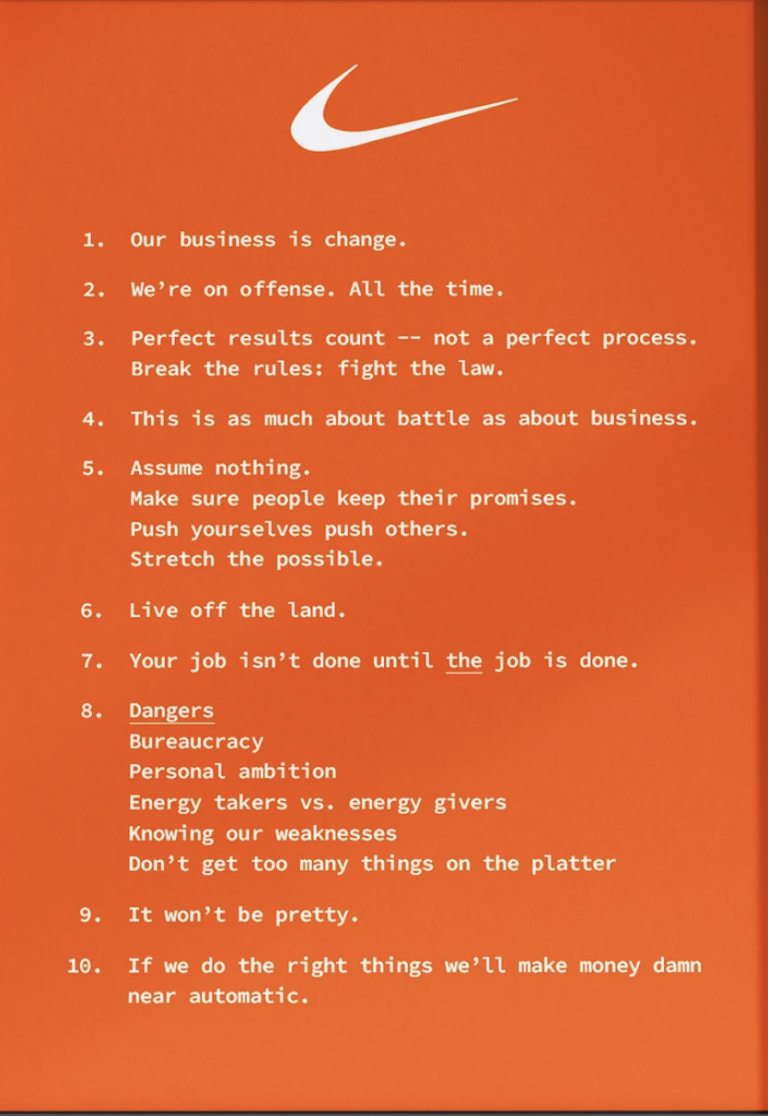By Adriano Izzo, Civil Lawyer and President of Gennaro Santilli Foundation,
What if we applied Rob Strasser’s legendary 10 Nike principles to the non-profit world?
The question – to the extent that it brings together two apparently distant and non-communicating worlds, that of a multi-billion dollar company and that of non-profit organizations – is deliberately provocative and, before giving an answer, requires some clarifications.
In 1977, Nike Inc.’s pioneering marketing director, Rob Strasser, wrote an internal memo titled “Principles.”
The “Principles” were a perfect synthesis of the innovative and counter-current vision that forged Nike’s corporate culture and which would lead the Portland company to write the history of sportswear and beyond, taking the scepter away from giants such as Adidas and Converse and becoming the global giant we all know.
They were true declarations of intent with a contagious motivational charge, capable of being applied not only to the business world, but also to the working and daily life of each of us, as an expression of values such as constancy, resilience, determination and sacrifice.
Their inspiring force is decidedly current and requires reflection on the way in which business should be done and – why not? – on the way in which a non-profit organization must pursue its institutional objectives.
Using conceptual categories specific to the profit world to define and catalog non-profit methods and processes is an intellectual exercise with unexpected and beneficial practical implications that must be part of the operational baggage of every manager of a non-profit organization.
There is a mistaken tendency to think that a non-profit organization should not pursue profit.
In reality, there is no more wrong thought and the resulting counterculture ends up diminishing the role that private non-profit organizations have and must have in society, reducing the collective imagination regarding their intervention to the perception of an action of volunteering characterized by being gratuitous and without any economic return (without taking anything away from volunteering and its extraordinary and fundamental role in achieving the social goals of a non-profit).
A clarification on the terminological level is necessary. The term “non-profit” does not have the meaning of not generating profit but rather of non-distribution of any profits produced and of the obligation to reinvest them in the cause without generating profit/gain for those who provide the economic or work resources. It is therefore distinguished from the term “non-profit” which instead has the meaning of absolute denial of profit. The prefix “no” takes on the meaning not only of absence but also of refusal of profit. To be clear, it is the equivalent of the term “no global” which embodies the absolute denial of any form of globalization. For a non-profit organization, therefore, profit must not be demonized and conceived as something wrong or even unfair. On the contrary, it must become an integral part of a functional corporate strategy to ensure the continuity and sustainability of the organization, which must also feed on profit to remain operational, ensure the continuity of its social interventions and plan future initiatives. Let’s now return to Nike’s principles and the question posed at the beginning of the article. With the necessary adjustments, the answer can only be affirmative but on one condition, namely that the non-profit sector, now more involved in social and environmental challenges of a global nature, knows how to insert into its organizational and financial processes a managerial culture capable of structuring the organization’s action in a strategic key, optimizing the operational mechanisms, redefining the control and reporting system. In other words, to be truly effective, non-profit organizations, on the one hand, must borrow from profit companies a system of knowledge and processes designed to ensure the creation of profit, and on the other, they must conceive economic performance, fruit of this system, not as an end or measure of their success but as a tool for pursuing social goals and using it to generate a more important and non-monetizable value, which is the well-being of the beneficiaries of their intervention and the communities in which they operate. With these premises, Nike’s principles are all indiscriminately valid and applicable from a non-profit perspective. One in particular, the first “Our business is change”, summarizes the attitude that every non-profit organization should have to generate a positive and measurable impact. Non-profit organizations have the duty to promote change, experiment with new methods and new solutions, cultivate a culture of considered risk and not fear failure. They must create innovation and build the cultural foundations so that such innovation can spread and become systemic. And, unlike profit companies, they can do all this while remaining detached from a competitive logic of dominance and conquest of the market because the real driver of change is the construction of synergistic partnerships and the sharing of methods and practices to broaden and spread the scope of the ‘intervention. Profit, created in a sustainable way and guaranteeing access to goods and services to all without distinction, is one of the tools for generating change. But managerial culture, long-term planning skills and resources are needed. This is the real challenge of non-profits.
Photo source: the 10 Nike principles




